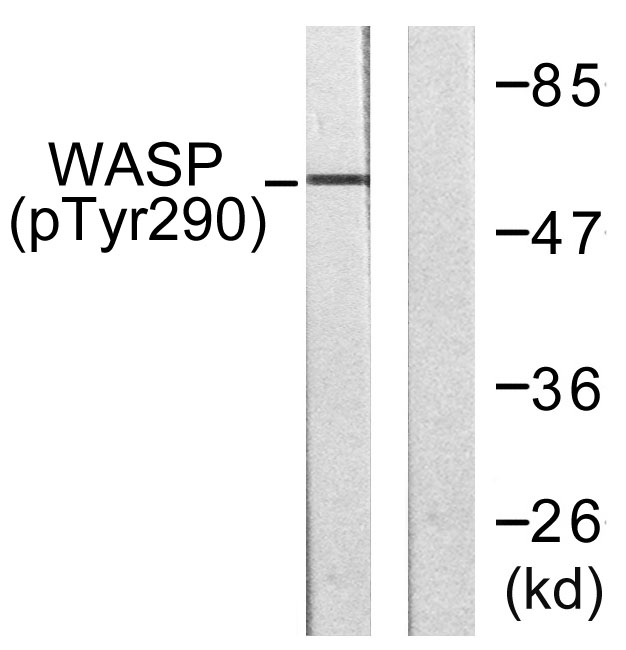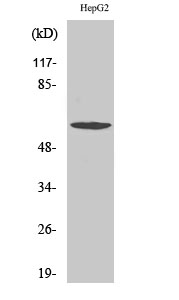WASP (phospho Tyr290) Polyclonal Antibody
- Catalog No.:YP0679
- Applications:WB;IHC;IF;ELISA
- Reactivity:Human;Mouse
- Target:
- WASP
- Fields:
- >>Chemokine signaling pathway;>>Adherens junction;>>Tight junction;>>Fc gamma R-mediated phagocytosis;>>Yersinia infection;>>Choline metabolism in cancer
- Gene Name:
- WAS
- Protein Name:
- Wiskott-Aldrich syndrome protein
- Human Gene Id:
- 7454
- Human Swiss Prot No:
- P42768
- Mouse Gene Id:
- 22376
- Mouse Swiss Prot No:
- P70315
- Immunogen:
- The antiserum was produced against synthesized peptide derived from human WASP around the phosphorylation site of Tyr290. AA range:256-305
- Specificity:
- Phospho-WASP (Y290) Polyclonal Antibody detects endogenous levels of WASP protein only when phosphorylated at Y290.
- Formulation:
- Liquid in PBS containing 50% glycerol, 0.5% BSA and 0.02% sodium azide.
- Source:
- Polyclonal, Rabbit,IgG
- Dilution:
- WB 1:500 - 1:2000. IHC 1:100 - 1:300. ELISA: 1:5000.. IF 1:50-200
- Purification:
- The antibody was affinity-purified from rabbit antiserum by affinity-chromatography using epitope-specific immunogen.
- Concentration:
- 1 mg/ml
- Storage Stability:
- -15°C to -25°C/1 year(Do not lower than -25°C)
- Other Name:
- WAS;IMD2;Wiskott-Aldrich syndrome protein;WASp
- Observed Band(KD):
- 60kD
- Background:
- The Wiskott-Aldrich syndrome (WAS) family of proteins share similar domain structure, and are involved in transduction of signals from receptors on the cell surface to the actin cytoskeleton. The presence of a number of different motifs suggests that they are regulated by a number of different stimuli, and interact with multiple proteins. Recent studies have demonstrated that these proteins, directly or indirectly, associate with the small GTPase, Cdc42, known to regulate formation of actin filaments, and the cytoskeletal organizing complex, Arp2/3. Wiskott-Aldrich syndrome is a rare, inherited, X-linked, recessive disease characterized by immune dysregulation and microthrombocytopenia, and is caused by mutations in the WAS gene. The WAS gene product is a cytoplasmic protein, expressed exclusively in hematopoietic cells, which show signalling and cytoskeletal abnormalities in WAS patients. A t
- Function:
- disease:Defects in WAS are a cause of X-linked severe congenital neutropenia (XLN) [MIM:300299]. XLN is an X-linked immunodeficiency syndrome characterized by recurrent major bacterial infections, severe congenital neutropenia, and monocytopenia.,disease:Defects in WAS are the cause of thrombocytopenia type 1 (THC1) [MIM:313900]. Thrombocytopenia is defined by a decrease in the number of platelets in circulating blood, resulting in the potential for increased bleeding and decreased ability for clotting.,disease:Defects in WAS are the cause of Wiskott-Aldrich syndrome (WAS) [MIM:301000]; also known as eczema-thrombocytopenia-immunodeficiency syndrome. WAS is an X-linked recessive immunodeficiency characterized by eczema, thrombocytopenia, recurrent infections, and bloody diarrhea. Death usually occurs before age 10.,domain:The CRIB (Cdc42/Rac-interactive-binding) region binds to the C-ter
- Subcellular Location:
- Cytoplasm, cytoskeleton . Nucleus .
- Expression:
- Expressed predominantly in the thymus. Also found, to a much lesser extent, in the spleen.
- June 19-2018
- WESTERN IMMUNOBLOTTING PROTOCOL
- June 19-2018
- IMMUNOHISTOCHEMISTRY-PARAFFIN PROTOCOL
- June 19-2018
- IMMUNOFLUORESCENCE PROTOCOL
- September 08-2020
- FLOW-CYTOMEYRT-PROTOCOL
- May 20-2022
- Cell-Based ELISA│解您多样本WB检测之困扰
- July 13-2018
- CELL-BASED-ELISA-PROTOCOL-FOR-ACETYL-PROTEIN
- July 13-2018
- CELL-BASED-ELISA-PROTOCOL-FOR-PHOSPHO-PROTEIN
- July 13-2018
- Antibody-FAQs
- Products Images

- Enzyme-Linked Immunosorbent Assay (Phospho-ELISA) for Immunogen Phosphopeptide (Phospho-left) and Non-Phosphopeptide (Phospho-right), using WASP (Phospho-Tyr290) Antibody

- Immunohistochemistry analysis of paraffin-embedded human brain, using WASP (Phospho-Tyr290) Antibody. The picture on the right is blocked with the phospho peptide.

- Western blot analysis of lysates from HepG2 cells, using WASP (Phospho-Tyr290) Antibody. The lane on the right is blocked with the phospho peptide.

